Welcome to the specialization course of NoSQL Systems. This six-week course provides in-depth insights into NoSQL databases, exploring their differences from relational databases and their implementation in various business scenarios.
Through a series of engaging videos and practical exercises, learners will gain proficiency in key-value, columnar, document, and graph databases. The course equips participants with the skills to identify and implement the most suitable NoSQL database based on specific business requirements.
Certificate Available ✔
Get Started / More Info
The course modules cover a broad range of topics, from an overview of NoSQL systems to practical implementation and application of different NoSQL databases, ensuring learners gain comprehensive insights and skills in the field.
Module 1: Introduction to NoSQL
Module 2: Key-value database
Module 3: Columnar Databases
Module 4: Document databases with MongoDB
Module 5: Graph Databases
Module 6: How to design reliable, scalable, and maintainable applications
Expressway to Data Science: R Programming and Tidyverse is a comprehensive specialization that teaches R programming and tidyverse for data science, preparing learners...
Azure Data Lake Storage Gen2 and Data Streaming Solution is a comprehensive course that covers Azure Data Lake Storage, event processing, streaming data, and security...
Doing More with SAS Programming is a comprehensive course that equips business analysts and SAS programmers with advanced data manipulation techniques using the...
Learn to code and present data using visualization tools in Jupyter Notebook. Gain the skills to describe, analyze, and communicate data effectively.